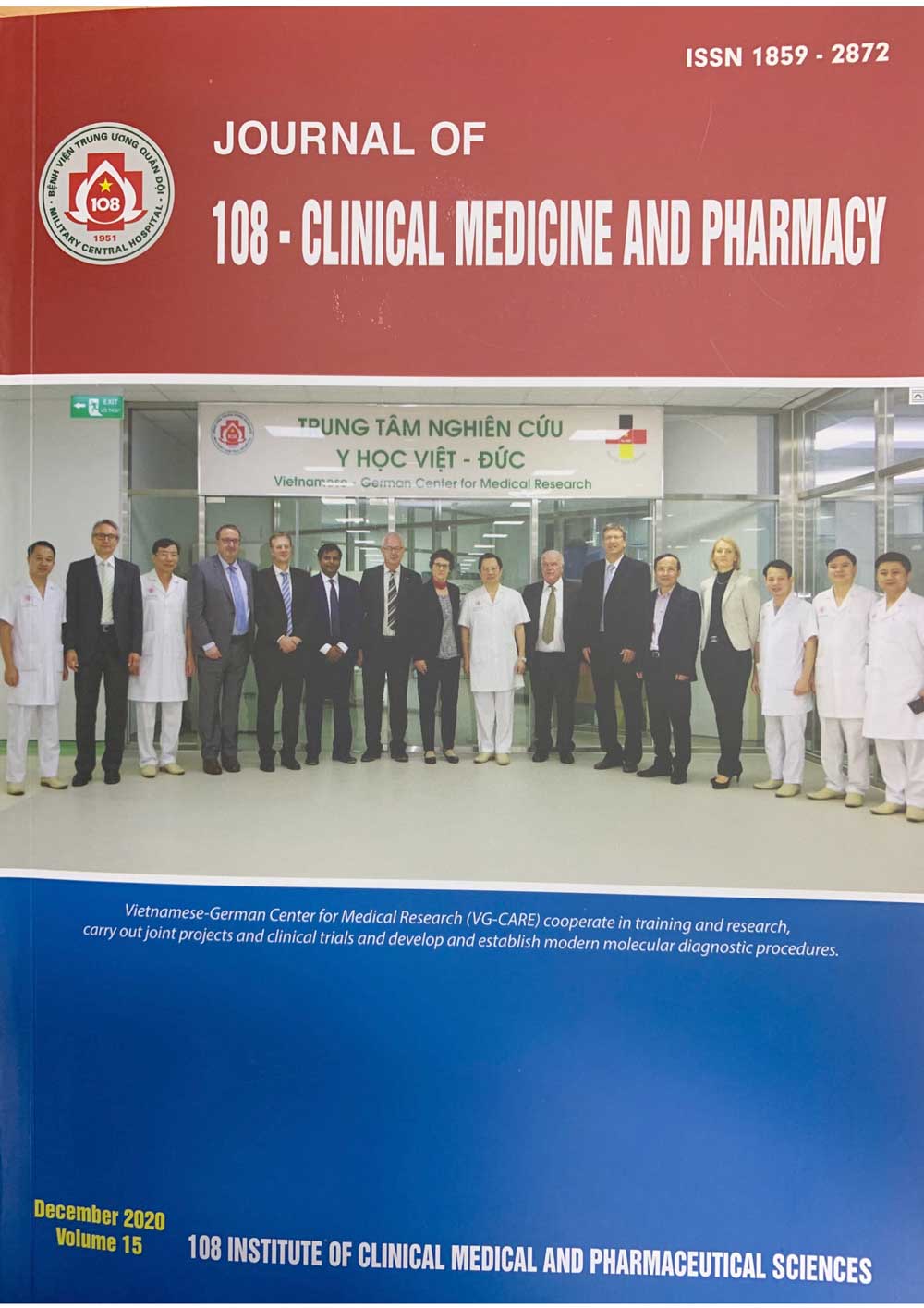Utility of 99mTc-MAA SPECT/CT for treatment plan of radioembolization using resin microspheres in HCC patients compared with 90Y PET/CT
Main Article Content
Keywords
Abstract
Objective: The purpose of our study is to validate the utility of 90Y PET/CT compared to SPECT/CT simulation in dosimetry and prediction of treatment response. Subject and method: Thirty-four consecutive hepatocellular carcinoma (HCC) patients, intermediate and advanced stage who underwent 90Y resin microsphere transarterial embolization (TARE) were recruited in the study. Lung shunt fraction (LSF), tumor to-normal liver uptake ratio (TNr) and absorbed dose for target tumors were estimated on 99m Tc-MAA SPECT/CT and 90Y PET/CT. The patients were followed up after treatment within 3 months (2.8 ± 0.84 months) on contrast-enhanced CT to assess treatment response using mRECIST criteria. Result: The imaging characteristics including heterogeneity, necrosis and thrombosis uptake were better delineated on PET/CT imaging than SPECT/CT. The agreement and correlation of TNr on PET/CT and SPECT/CT were stronger. Dose delivery to tumor (Dtumor) threshold of 125Gy estimated on 99mTc-MAA SPECT/CT was more accurate than PET/CT for prediction of treatment response after 90Y-radioembolization in HCC patients with sensitivity of 87.5% and specificity of 90%. Conclusion: 99mTc-MAA SPECT/CT is superior to PET/CT to predict treatment response after 90Y resin microsphere treatment.
Article Details
References
2. Salem R, Lewandowski RJ, Mulcahy MF, Riaz A, Ryu RK, Ibrahim S et al (2010) Radioembolization for hepatocellular carcinoma using Yttrium-90 microspheres: A comprehensive report of long-term outcomes. Gastroenterology 138(1): 52-64.
3. Ahmadzadehfar H, Sabet A, Biermann K, Muckle M, Brockmann H, Kuhl C et al (2010) The significance of 99mTc-MAA SPECT/CT liver perfusion imaging in treatment planning for 90Y-microsphere selective internal radiation treatment. J Nucl Med 51(8): 1206-1212.
4. Giammarile F, Bodei L, Chiesa C, Flux G, Forrer F, Kraeber-Bodere F et al (2011) EANM procedure guideline for the treatment of liver cancer and liver metastases with intra-arterial radioactive compounds. Eur J Nucl Med Mol Imaging 38(7): 1393-1406.
5. Gil‐Alzugaray B, Chopitea A, Iñarrairaegui M, Bilbao JI, Rodriguez‐Fraile M, Rodriguez J et al (2013) Prognostic factors and prevention of radioembolization‐induced liver disease. Hepatology (Baltimore, Md) 57(3): 1078-1087.
6. Gates VL, Esmail AA, Marshall K, Spies S, Salem R (2011) Internal pair production of 90Y permits hepatic localization of microspheres using routine PET: Proof of concept. J Nucl Med 52(1): 72-76.
7. Kim MN, Kim BK, Han KH, Kim SU (2015) Evolution from WHO to EASL and mRECIST for hepatocellular carcinoma: Considerations for tumor response assessment. Expert Rev Gastroenterol Hepatol 9(3): 335-348.
8. Lenoir L, Edeline J, Rolland Y, Pracht M, Raoul J-L, Ardisson V et al (2012) Usefulness and pitfalls of MAA SPECT/CT in identifying digestive extrahepatic uptake when planning liver radioembolization. European Journal of Nuclear Medicine and Molecular Imaging 39(5): 872-880.
9. Garin E, Lenoir L, Rolland Y, Laffont S, Pracht M, Mesbah H et al (2011) Effectiveness of quantitative MAA SPECT/CT for the definition of vascularized hepatic volume and dosimetric approach: Phantom validation and clinical preliminary results in patients with complex hepatic vascularization treated with yttrium-90-labeled microspheres. Nucl Med Commun 32(12): 1245-1255.
10. Garin E, Rolland Y, Laffont S, Edeline J (2016) Clinical impact of (99m)Tc-MAA SPECT/CT-based dosimetry in the radioembolization of liver malignancies with (90)Y-loaded microspheres. European Journal of Nuclear Medicine and Molecular Imaging 43: 559-575.
11. Garin E, Rolland Y, Pracht M, Le Sourd S, Laffont S, Mesbah H et al (2017) High impact of macroaggregated albumin-based tumour dose on response and overall survival in hepatocellular carcinoma patients treated with 90Y-loaded glass microsphere radioembolization. Liver Int 37(1): 101-110.
12. Kao YH, Hock Tan AE, Burgmans MC, Irani FG, Khoo LS, Gong Lo RH et al (2012) Image-guided personalized predictive dosimetry by artery-specific SPECT/CT partition modeling for safe and effective 90Y radioembolization. J Nucl Med 53(4): 559-566.
 ISSN: 1859 - 2872
ISSN: 1859 - 2872
